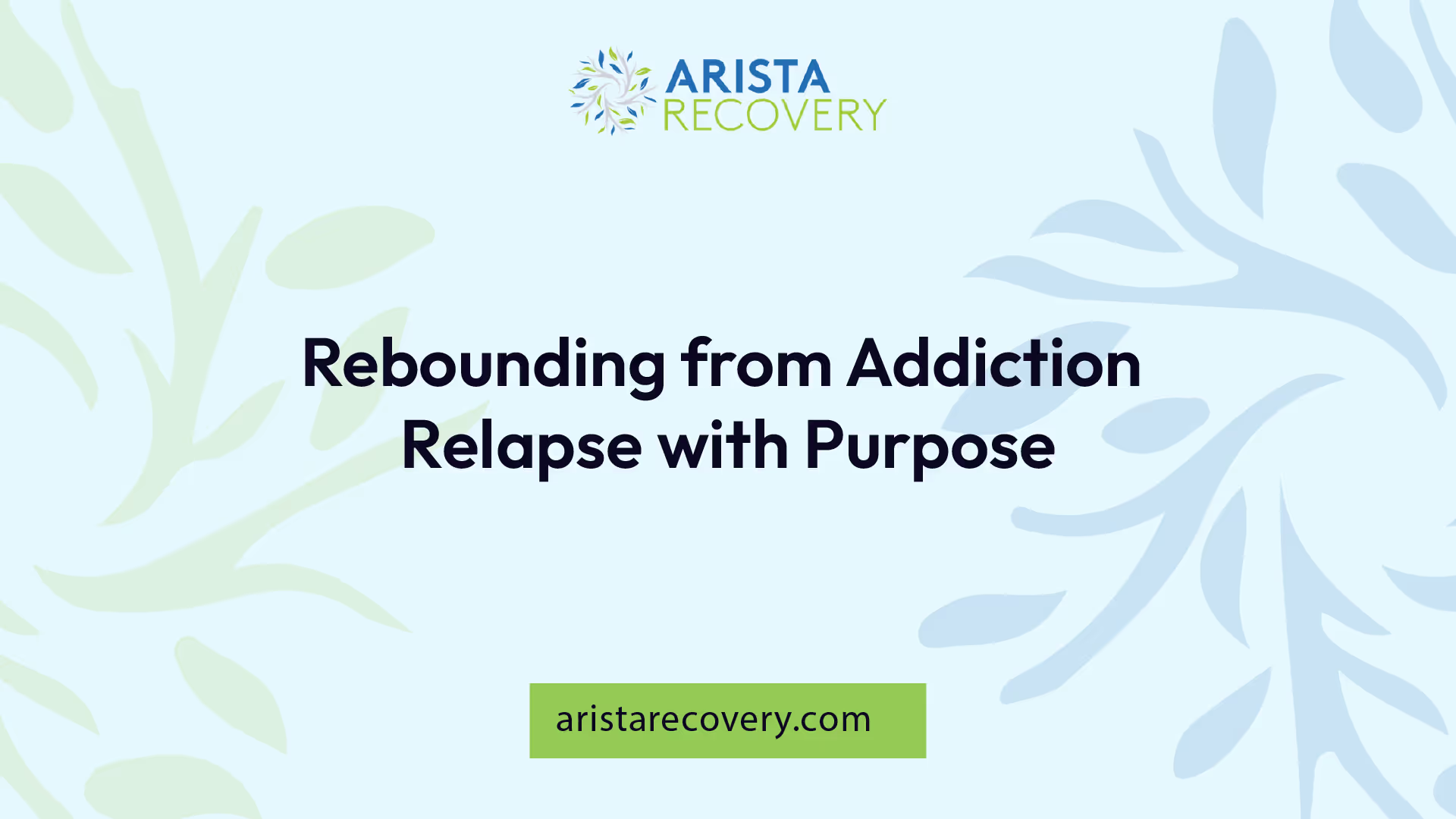Rebounding from Addiction Relapse with Purpose

Understanding Addiction Relapse
Definition of Relapse
Relapse refers to the return to substance use after a period of sobriety. It is a common experience in the recovery process and can occur for various reasons. Recognizing the stages of addiction relapse—emotional, mental, and physical—can be vital for individuals seeking to maintain their recovery. Emotional relapse is marked by negative feelings like anger and anxiety, while mental relapse includes thoughts that may lead to substance use. Physical relapse is the act of using drugs or alcohol again [1].

Common Triggers for Relapse
Common triggers for addiction relapse include a combination of internal and external factors. Understanding these triggers can help individuals develop strategies to prevent relapse and manage their recovery effectively. The following table summarizes some key triggers:
Trigger TypeExamplesInternalStress, shame, guilt, loneliness, boredom, anger, fear, sadnessExternalPeople, places, and situations associated with past substance use
Awareness of both internal and external triggers is essential to avoid relapse. Stress and feelings of loneliness or guilt often lead individuals to seek relief through substance use as a coping mechanism Northstar Behavioral Health. Recognizing these triggers and developing coping strategies, such as practicing mindfulness or avoiding certain people and places, can be crucial for maintaining sobriety. For more insights, explore our article on the four triggers for relapse in recovery.
Understanding the emotional landscape and potential triggers can equip individuals with the tools needed to navigate their recovery journey. For more guidance, visit our section on the difference between slip and relapse and four important things about relapse.
Importance of Support Systems
A strong support system plays a vital role for individuals rebounding from addiction relapse. It provides the necessary foundation for recovery by fostering connection, accountability, and motivation.
Role of Support in Recovery
Having a support system during recovery can significantly reduce feelings of loneliness and isolation commonly experienced by individuals facing addiction. Support from friends, family, and recovery groups can create a sense of belonging and connection to others who understand the journey. According to Spero Health, a robust support system offers practical assistance during the early stages of recovery, helping with tasks like transportation, grocery shopping, and errands. This support helps to alleviate stress and allows individuals to focus on their recovery journey.
Support systems provide accountability and motivation during challenging times of temptation. They serve as reminders to maintain healthier patterns and avoid isolation. This connection can be crucial when faced with potential relapse triggers, which should be regularly monitored as part of relapse prevention strategies.
Types of Supportive Relationships
Support systems can take various forms, each providing unique benefits to individuals in recovery. Some of the most valuable relationships include:
Type of SupportDescriptionFamily and FriendsThey can offer emotional support, encouragement, and practical help throughout recovery.SponsorsExperienced individuals in recovery who can provide guidance and accountability during the recovery journey.TherapistsTrained professionals who offer therapeutic support and coping strategies tailored to individual needs.Support GroupsPeer-led groups that foster a sense of community with others experiencing similar challenges, such as Narcotics Anonymous or Alcoholics Anonymous.
Group therapy is typically preferred over individual therapy for drug abuse treatment, as it creates a supportive environment filled with peers sharing similar experiences. While different from group therapy, twelve-step programs also offer crucial peer support.
Overall, a strong support system consisting of various relationships is crucial for individuals rebounding from addiction relapse. They provide the encouragement, understanding, and accountability needed to navigate the difficult path of recovery. For insights into recognizing the signs leading to relapse, explore our article on five signs an addict is about to relapse.
Strategies for Relapse Prevention
Implementing effective strategies for relapse prevention is vital for those rebounding from addiction relapse. Understanding how to identify triggers, build coping skills, and maintain healthy habits can significantly enhance the recovery journey.
Identifying Triggers
Recognizing triggers is the first step in preventing relapse. Common triggers include stress, shame, guilt, loneliness, and boredom, which may lead individuals to seek substances as a temporary escape. Keeping a journal to note feelings, thoughts, and situations that lead to cravings can help individuals identify personal triggers.
Common TriggersDescriptionStressIncreased pressure can lead to substance use.Shame and GuiltNegative feelings about oneself may prompt use.LonelinessFeelings of isolation can drive individuals toward substances.BoredomLack of fulfilling activities can trigger cravings.
Understanding these triggers assists individuals in developing specific strategies to cope with them effectively.
Building Coping Skills
Building effective coping skills is crucial for dealing with triggers that may lead to relapse. Coping mechanisms can encompass stress and anger management, communication skills, and other essential relapse-prevention tools. Therapy and counseling often provide individuals with the skills necessary to confront challenges and manage negative emotions constructively [4].
Individuals can practice various coping techniques, including:
Healthy Habits for Prevention
Maintaining healthy habits is integral to preventing relapse. Establishing daily routines, getting adequate sleep, avoiding identified triggers, practicing mindfulness, engaging in regular physical activity, and maintaining proper nutrition can significantly impact well-being during the recovery process [3].
Healthy HabitBenefitsEstablishing RoutinesProvides structure and predictability in daily life.Getting Adequate SleepPromotes emotional stability and cognitive function.Practicing MindfulnessReduces anxiety and fosters better emotional regulation.Regular ExerciseBoosts mood and combats stress effectively.Proper NutritionSupports overall health and improves energy levels.
Incorporating these strategies can empower individuals to maintain healthier patterns and succeed in their recovery. Recognizing and addressing the complex feelings surrounding addiction is essential for building a resilient recovery path. For more insights on staying alert to the signs of relapse, read about the five signs an addict is about to relapse.
Stages of Relapse
Understanding the stages of relapse is crucial for anyone involved in the journey of recovery from addiction. Each stage can provide insights into behavior and emotional state, allowing for proactive measures to rebalance and stay on track. The three primary stages of relapse are emotional, mental, and physical.
Emotional Relapse
Emotional relapse is the first stage in the process of returning to substance use. At this point, individuals may not consciously think about using drugs or alcohol, but their emotions can signal trouble ahead. Common feelings experienced during this phase include anger, anxiety, and sadness. Behaviors associated with emotional relapse often set the foundation for a later relapse. It may involve withdrawing from social connections, neglecting self-care, or experiencing irritability.
Signs of Emotional RelapseSample BehaviorsIncreased irritabilityWithdrawal from family and friendsFeelings of anger or frustrationNeglecting healthy routinesAnxiety or restlessnessIsolating oneself from support systems
Recognizing these emotional changes is vital, as it can prompt individuals to seek support or re-engage with healthy habits, potentially avoiding further regression.
Mental Relapse
As the process progresses, individuals may enter the mental relapse phase, where thoughts of substance use begin to surface. This stage involves the individual experiencing an internal battle between wanting to remain sober and the temptation to reconnect with substances. Feelings of discontent and restlessness may intensify during this phase. Rationalizing past use or daydreaming about using can also manifest.
Symptoms of Mental RelapseIndicatorsRationalizing past useThinking about situations that led to past useDreaming about using substancesCompromising on abstinent behaviorsFeeling a growing desire to useObsessing over how use might solve current problems
Addressing these thoughts through strategies such as therapy or support groups can help individuals navigate this turbulent phase and reinforce their commitment to sobriety.
Physical Relapse
Physical relapse represents the final stage, characterized by the action of giving in to the urge to use drugs or alcohol. It is the ultimate result of the preceding emotional and mental stages. During this phase, individuals may find themselves using substances again, often resulting in a return to previous patterns of behavior associated with their addiction. Recognizing the preceding stages can facilitate timely intervention and a return to healthier practices.
Defining Characteristics of Physical RelapseActions TakenActing on urges to use substancesRe-initiating substance useLoss of abstinenceEngaging in risky behaviors previously avoided
Understanding these stages can aid individuals in rebounding from addiction relapse and help create effective strategies to prevent a full relapse. By acknowledging and addressing emotional and mental triggers early, individuals can protect their recovery journey and enhance their overall well-being. For further insights on the nuances of relapse, explore the difference between slip and relapse and the four triggers for relapse in recovery.
Therapy and Interventions
Addressing addiction relapse requires a multi-faceted approach that includes various therapeutic options, medications for relapse prevention, and effective monitoring techniques. Each of these plays a vital role in rebounding from addiction relapse.
Therapy Options
Counseling is fundamental in managing substance use disorders as it helps individuals navigate cravings and avoid relapse post-detox. A variety of therapy types can support individuals in maintaining sobriety while addressing underlying mental health issues.
Some effective therapy options include:
Medications for Relapse Prevention
Certain medications can assist individuals in preventing relapse for specific substance use disorders. Here’s a brief overview of commonly used medications:
MedicationSubstance Use DisorderPurposeDisulfiramAlcoholPrevents drinking by causing unpleasant reactions when alcohol is consumedNaltrexoneAlcoholReduces cravings for alcohol and helps prevent relapseAcamprosateAlcoholAssists in maintaining abstinence post-detoxMethadoneOpioidHelps reduce withdrawal symptoms and cravings for opioidsBuprenorphineOpioidReduces cravings and withdrawal symptomsBupropionNicotineAids in smoking cessation
Although these medications can be effective, challenges such as non-adherence and potential for abuse must be addressed.
Monitoring and Adherence
Effective monitoring plays a crucial role in detecting substance use and ensuring adherence to treatment plans. Various methods for monitoring include:
Monitoring can inform interventions such as contingency management programs, which offer incentives for maintaining sobriety, thereby helping to discourage relapse [5].
Incorporating these therapies, medications, and monitoring techniques into a personalized treatment plan can enhance the chances of recovery and reduce the likelihood of relapse. For more insights on navigating relapse, explore the difference between slip and relapse and learn about four triggers for relapse in recovery.
Mindfulness in Relapse Prevention
Mindfulness has emerged as a powerful tool for individuals working to maintain their recovery from addiction. Integrating mindfulness practices into daily routines can significantly enhance coping strategies and reduce the risk of relapse.
Benefits of Mindfulness
The benefits of mindfulness extend beyond simply fostering a state of calm. New research indicates that mindfulness and meditation techniques have a profound impact on preventing relapse for individuals dealing with substance abuse. Here are some key advantages:
BenefitDescriptionEnhanced ClarityMindfulness promotes mental clarity, allowing individuals to make more thoughtful decisions in moments of temptation.Self-awarenessThese practices increase self-awareness, helping individuals to recognize their cravings and triggers without judgment.Emotional RegulationMindfulness fosters a compassionate attitude towards oneself, reducing feelings of guilt and shame often associated with relapse.Stress ManagementRegular meditation practices contribute to a greater sense of inner stability, helping to cope with recovery challenges and stressors.
Sources suggest that practicing mindfulness meditation can create a space between the urge to use substances and the actual response, which helps in decision-making during critical moments [6].
Mindfulness Practices
Integrating mindfulness practices into daily routines can create structure and enhance overall well-being. Some effective practices include:
Structured meditation practices can lead to improvements in focus, emotional stability, and stress reduction, all of which are essential for someone in recovery [6].
Integrating Mindfulness into Recovery
Incorporating mindfulness into a recovery plan is straightforward yet impactful. Here are practical steps to seamlessly integrate mindfulness practices:
By embracing mindfulness as a core aspect of their recovery journey, individuals can lay a strong foundation for lasting change while actively working to prevent relapse. For more insights into the topic of relapse, check out our articles on the difference between slip and relapse and four triggers for relapse in recovery.
References
[2]:
[3]:
[4]:
[5]:
[6]:
You’re not alone in this.
When mental health challenges and addiction intersect, it can feel isolating. At Arista, we offer compassionate, evidence-based, and trauma-informed care to help you heal, grow, and move forward.
You’re not alone in this.
When mental health challenges and addiction intersect, it can feel isolating. At Arista, we offer compassionate, evidence-based, and trauma-informed care to help you heal, grow, and move forward.
Support that moves with you.
You’ve taken a brave first step. At Arista Recovery, we’re here to help you continue with best-in-class care designed for long-term healing and support.
.webp)






